World Rapid and Blitz Team Championships return with record prize fund and new format
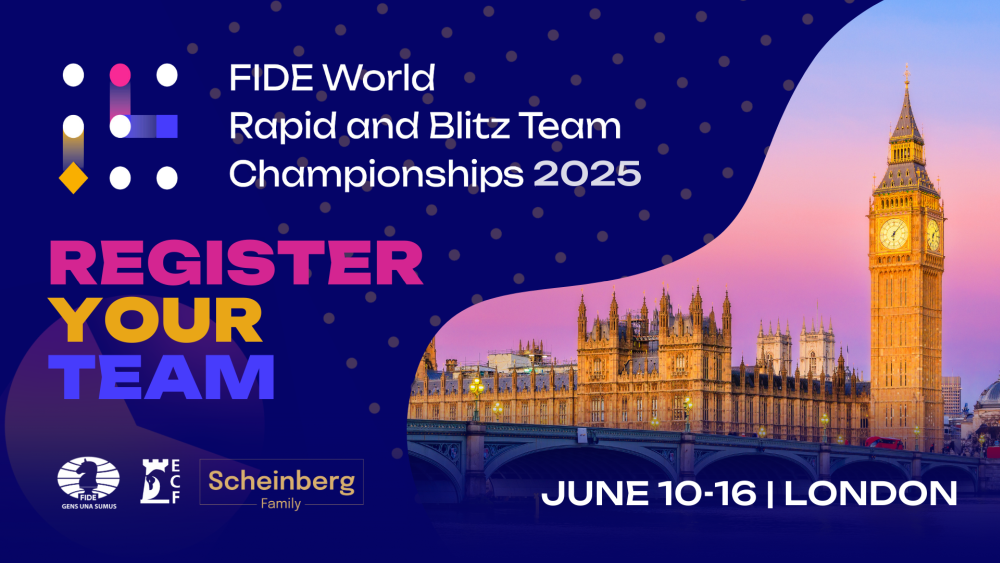
The World Rapid and Blitz Team Championships are back—bigger, bolder, and with a record-breaking €500,000 prize fund. After thrilling editions in Düsseldorf (2023) and Astana (2024), the event heads to London from June 10–16, introducing a new knockout stage in the Blitz Following the addition of the Blitz format in Astana 2024, this year’s edition introduces further improvements – a significantly increased prize fund and an extra day for the Blitz competition for the knock-outs. The championships will take place at Novotel London West Hotel (1 Shortlands Hammersmith International Ctre, London W6 8DR, United Kingdom). The total prize pool for 2025 jumps to €500,000, a significant increase from last year’s €350,000. The Rapid event will distribute €310,000, while the Blitz tournament’s prize fund rises to €190,000. Here’s how the prize money is allocated: Another notable change for this year is the addition of the second day of the Blitz. After a successful run of the Blitz in 2024, FIDE has decided to expand the competition by adding the separate second day for knock-out stage. Blitz games will follow the standard time control of three minutes plus two seconds per move, but the competition will now feature two distinct stages instead of one. In the first stage, teams will be grouped into pools of similar strength. Each pool will compete in a round-robin tournament, with a maximum of 16 teams advancing to the knockout stage. On the second day of the Blitz, the qualifiers from stage one will play a knock-out tournament, determining the winner. The rising interest in chess globally and in the UK Chess has seen a surge in popularity in recent years, both globally but also in the UK, where in recent years the government has also provided funding for the sport. For the first time in 30 years, the public broadcaster BBC will air a TV program dedicated to chess. The show will follow 12 of Britain’s rising stars of chess as they play against one another and explore the beauty of the game. “The growing popularity of chess in the UK and the global appeal of London as an international hub is one of the key reasons why we decided to bring the event here. The addition of another day for the Blitz competition and this substantial increase in the prize fund reflects the growing prestige of the competition and the continuing global interest in chess,” FIDE President Arkady Dvorkovich said. Team composition The event is open to any team that meets the official requirements, which have been designed to ensure there is an inclusive, level-playing field. Each team must have at least six and no more than nine players. This has to include at least one female player. Additionally, each team has to have one recreational player—defined as a participant who has never achieved a FIDE Standard, Rapid, or Blitz rating of 2000 Elo (or an equivalent national rating, as determined by FIDE’s Global Strategy Commission) up to and including the March 2025 rating lists. This rule is designed to encourage broader participation and give aspiring players a chance to compete alongside seasoned professionals. Additionally, each team must have a captain, who may also be one of the players. How to register for the event The forthcoming event in London is open to all and will see 60 teams take part – 10 based on their highest ratings and 45 based on earliest registration, with five wild card teams provided by the organizers. Teams wishing to participate need to apply by filling in a REGISTRATION FORM by May 10. Teams are required to register at least six players. Full event regulations and team participation requirements are available here: handbook.fide.com/files/handbook/WRTC2025Regulations.pdf The FIDE World Rapid and Blitz Team Championships have a prominent place in the chess calendar and will offer a chance for top-tier Grandmasters and chess enthusiasts to play together, giving the public a chance to see the world’s best players in action. Official website: https://worldrapidblitzteams.fide.com/
FIDE Women’s Chess celebrations: A truly global movement
March is a time of reflection and celebration for women and girls worldwide. International Women’s Day serves as a powerful reminder of resilience, achievements, and the ongoing pursuit of gender equality. This year, the FIDE Commission for Women’s Chess (WOM) transformed this moment into a global movement—cooperating with organizers on 4 continents to host inspiring chess events that highlighted the role of women in the game and beyond. We have officially collaborated with organizers located in 4 continents: Kazakhstan (Asia), Kenia (Africa), Poland, France (Europe) and St. Lucia (Americas), who have been doing a remarkable job in their countries and beyond for years now, to promote chess for girls and women. Beyond these flagship events, the Chess Women’s Day Celebration – Strength, Community, Empowerment initiative called on organizers worldwide to hold chess events throughout March in honor of women and girls. Over 40 events in around 30 countries joined the movement, making this a truly global celebration. At the heart of our celebrations was the Qazaq Queens Chess Fest 2025. Kazakhstan: A grand stage for Women’s Chess The Qazaq Queens Chess Fest 2025, held in Almaty on March 7, was the largest of these events and had the special honor of being attended by FIDE President Arkady Dvorkovich, who made the ceremonial first move. Organized by the Kazakhstan Chess Federation (KazChess) with FIDE’s support, the blitz tournament brought together 95 participants of all ages. The competition followed a 9-round Swiss format with a 3+2 time control, and 13-year-old WFM Aiaru Altynbek triumphed with 8 points. The top three finishers, all recipients of the Young Talent Support Programme scholarships, shared in the event’s KZT 2 million ($4,000) prize fund. The tournament also featured an art exhibition by Kazakh artist Aituar Amirkhanova, whose works explored themes of women’s experiences and self-expression. Special guest Inessa Nazarova, Mrs. Supermodel Worldwide 2019, inspired participants with a motivational speech, reinforcing the theme of empowerment. Kazakhstan continues to shine as a hub for women’s chess, and the Qazaq Queens Chess Fest, reinforcing the role of the game in gender equality. Kenya: A community-driven success In Nairobi, Kenya, we proudly supported the Queen’s Tournament on March 8. The event attracted an impressive 43 female players, including a 7-year-old girl, the youngest participant, who was recognized with a medal. The event, played on DGT boards and FIDE-rated, awarded trophies to the top three players and medals to 11 others. Notably, a group of chess moms stepped up to sponsor additional cash prizes, demonstrating how the chess community can empower and support one another. This grassroots initiative ensured a highly competitive and rewarding experience for the participants, embodying the spirit of unity and encouragement in women’s chess. Poland: Nurturing future champions The IV Memoriał Apolonii Litwińskiej, part of a big Women’s Chess Festival in Wrocław, Poland, was a key event celebrating Women’s Chess. The Festival had an honor of being attented by Łukasz Turlej, FIDE Secretary General, who opened the closing ceremony of the event and presented awards to the winners. Supported by WOM, the tournament featured top Polish junior players, many of whom are national champions and world championship medalists. The event allowed young talents to compete alongside women grandmasters like Alina Kashlinskaya, Teodora Injac, and Aleksandra Malcewska. The top 8 juniors advanced to the finals on March 9, where Varvara Matskevich emerged victorious, defeating Kaja Rządzkowska. Beyond competition, organizers and WOM provided an enriching experience with a special workshop led by mental coach Hanna Rychlik, who works with top athletes, including Poland’s No. 2 female chess player, Klaudia Kulon. The interactive session focused on confidence, handling pressure, and overcoming challenges in professional sports. Additionally, all participating girls took part in a chess-themed photo shoot, making them feel like stars both on and off the board. France: A chess showcase in Saint-Tropez The event in Saint-Tropez, France, was held under the theme “For ALL Women and Girls: Rights, Equality, and Empowerment”, organized by Club d’Échecs de Saint-Tropez in cooperation with WOM. A unique simultaneous exhibition took place in the beautiful garden of the Annonciade Museum, featuring the Prochaieva sisters—Alina, Tina, Yelyzaveta, and Olha—quadruplet refugees from Kyiv, Ukraine. Facing off against local players from Saint-Tropez and the Côte d’Azur region, the sisters’ participation was a poignant symbol of resilience and hope. Every participant received a commemorative diploma, medal, flowers, and a participation gift, reinforcing the spirit of appreciation and inclusion in chess. Americas: Honoring women’s contributions to chess In the Americas, Tris-Ann Richards, President of the St. Lucia Chess Federation and a new national champion, hosted a special event that celebrated the achievements of women in chess. The session featured Francisco Cruz, Chair of the FIDE America Diversity Commission, and Sonja Johnson, President of the Trinidad and Tobago Chess Federation, who shared insights on how women can access opportunities in the chess world. A special award was presented to Vernessa James in recognition of her contributions to the St. Lucia Chess Federation, further emphasizing the importance of honoring women’s leadership and dedication to the game. The event was hosted online and locally, allowing everyone to join the lectures, and celebrations, via zoom. A global celebration of Women’s Chess This year’s Chess Women’s Day Celebration proved that chess can be a powerful force for empowerment, unity, and recognition of women’s achievements. FIDE WOM Chair Anastasia Sorokina reflected on the success of the global initiative: “March is a time of celebrations of women, and this year we introduced a true chess Marathon to celebrate Women’s Chess. As Chair of WOM, I am extremely happy to see so many devoted, talented, and unique people have been involved in our initiative worldwide. Our mission is to attract as many women as possible to the incredibly diverse world of chess—not just as players, but also as arbiters, trainers, journalists, and organizers. Projects like Chess4All & All4Chess and the Queens’ Challenge show women how incredible they are and how many opportunities chess offers them. With so many federations supporting us in this March in a global movement to celebrate Women’s Month, I am sure we are moving in the
History of Chess960
Robert James Fischer went down in chess history not only as a great champion but also as an author and a popularizer of Chess960, also known as Fischer Random Chess. On the 82nd anniversary of the 11th World Champion’s birth, we publish a piece on the chess variant that bears his name. Early contributions The concept of random chess, also known as shuffle chess, was first proposed by the Dutch chess enthusiast Philip Julius van Zuylen van Nijevelt (1743-1826). In his renowned treatise on chess, La Supériorité aux Échecs, published in 1792, Van Zuylen van Nijevelt articulated his disdain for the repetitive patterns often found in standard chess openings. He proposed the idea of randomizing the starting positions of the main pieces to create a vast array of unique starting positions, eliminating the possibility of pre-game memorization or extensive opening theory. This early conception of random chess by Van Zuylen van Nijevelt laid the foundation for Chess960. The earliest documented games of shuffle chess were played between Van der Hoeven and Alexandre in Mannheim in 1842. One of these games is preserved in Sissa, the Netherlands’ first long-standing chess journal, demonstrating an initial position with two advanced pawns on each side. A later game played by Van der Hoeven was against Baron von der Lasa (1818-1899), adhering more closely to the contemporary rules of random chess, except for the monochromatic bishop pairs. Following Van der Hoeven’s visit, the Sissa Chess Society received an invitation from the Philidor Chess Society in Amsterdam, in collaboration with Van der Hoeven, to organize a shuffle chess tournament. Originally intended as a tournament among the eight prize winners of the 1851 Philidor-organized event, logistical challenges led to invitations being extended to other chess societies. Ultimately, a tournament with seven players from Amsterdam, along with the 74-year-old Van der Hoeven, was organized. Maarten Van’t Kruijs emerged as the winner of the tournament, reinforcing the growing sentiment that the removal of opening theory allows true chess talent to shine. Bronstein and Benko’s support Just as the Dutch inventors of Shuffle chess back in the 18th century, World Champion Challenger David Bronstein promoted the same idea in the late 1940s, and then later Pal Benko in the 1970s. They referred to it by various names such as: Placement Chess, Pre-Chess, Shuffle-Chess. In the variant promoted by Bronstein and Benko, the game starts with white and black pawns set as usual, but the initial position of other pieces is selected by the players. The two players place their pieces alternately, one at a time. White first places one of his pieces on his first rank, and then Black does the same. Players continue to alternate in this manner until all pieces have been placed, with the only restriction being that bishops must be on opposite-color squares. The game then proceeds in the usual way. Strategic chess thinking therefore begins with the first placements of pieces. Yet, the essence of the game remains the same, as the pieces move as usual as in traditional chess, and the game similarly ends with checkmate. Fischer’s influence and the evolution of Shuffle-Chess to Chess960 The year after Bobby Fischer returned to chess in 1992 for a second match versus Boris Spassky, he moved to Budapest at the suggestion of Susan Polgar. For nearly a year, he was a regular visitor to the Polgar family. He sought the help of Susan Polgar to better the rules of Shuffle-Chess. They spent a lot of time discussing and experimenting with various versions of the rules, which at times was joined by Pal Benko. Fischer’s goal was to eliminate what he considered the complete dominance of opening preparations in classical chess, and replacing it with creativity and talent. Like others before him, Fischer believed that eliminating memorized book moves would level the playing field. In those days, Fischer and Susan Polgar initially played by the Shuffle-Chess rules promoted by Bronstein and Benko. There were three key points of debates: if the pieces should be required to be positioned symmetrically; if castling should be part of the game, and if so, in which exact form; and if Bishops can start on any square, or with the restriction of starting on opposite-colored squares. The Final Rules by Fischer and Susan Polgar Fischer and Susan Polgar concluded the following: – Castling should be incorporated into the rules (by requiring the King to start somewhere in between the two Rooks), and the King and Rook would end up in their traditional castling positions. – Bishops must start the game on opposite color squares, as in traditional chess. – The pieces from both sides should be set up symmetrically. Back then, it was originally known as “Fischerandom” or “Fischerandom chess”, the name given by Fischer himself. While in Budapest, Fischer consulted mathematicians to figure out how many such piece arrangements were possible. The answer was 960, which as far as he was concerned, was enough to prevent players from planning their opening moves in advance. Hence, the name Chess960. Fischer Random Chess was formally introduced to the public on June 19, 1996, in Buenos Aires, Argentina. Here is a link to all possible 960 starting positions: https://web.archive.org/web/20070402110500/http://www.playchess960.com/images/AllPositionsChess960.gif Chess 960 Tournaments There have been many Chess960 tournaments held since the first one which was held in Kaniza, Yugoslavia, in the spring of 1996. Some of the most notable ones were: The Mainz Championship series 2001-2009, organized by Hans-Walter Schmitt. In the Battle of the Sexes match, which took place in Lindsborg, Kansas between Anatoly Karpov and Susan Polgar, 2 games of the Chess960 variant were included, ended with one win for each player. The first edition of the European Fischer Random Cup was held in Reykjavík on March 9, 2018, on Fischer’s 75th birthday. In February 2018, a Chess960 match between former classical World Chess Champion Magnus Carlsen and the unofficial Fischer Random Chess world champion Hikaru Nakamura was held in Høvikodden, Norway. The match consisted of 8 rapid and 8
Salome Melia to replace Lela Javakhishvili in FIDE WGP India
IM Lela Javakhishvili, Georgia’s nominee, has withdrawn from the FIDE Women’s Grand Prix India for personal reasons. In accordance with WGP regulations, she will be replaced by IM Salome Melia (pictured above), who is now set to compete in the fifth leg of the series. A native of Batumi, Georgia, Melia won the European Under-18 Girls Championship twice, in 2004 and 2005. She also claimed silver at the Women’s European Individual Chess Championship in 2013 and bronze in 2014. A two-time Georgian Women’s Champion (2008 and 2010), she has represented her country in multiple Chess Olympiads, including the 45th edition in Budapest. Additionally, she was a member of the gold medal-winning Georgian team at the 2015 Women’s World Team Chess Championship in Chengdu. The fifth leg of the FIDE WGP 2024–25 will take place in India from April 13 to 24, with Salome Melia replacing Lela Javakhishvili in the draw. The full pairings can be found below: FIDE Women’s Grand Prix India 2025 Pairings (PDF) FIDE WGP official website: https://womengrandprix.fide.com/ Photo: Anna Shtourman
Pranav and Shukhman win 2025 World Junior Championship in Montenegro
The 2025 World Junior Chess Championship concluded in Petrovac, Montenegro. Over the last thirteen days, almost two hundred and sixty boys and girls from sixty-seven countries competed for the prestigious titles. Indian Grandmaster and second seed Pranav Venkatesh (pictured below, right) emerged as the winner in the open section. He delivered an impressive 9/11 score, remaining unbeaten throughout the tournament with a rating performance of 2721, fully deserving the title. Slovenian IM Matic Lavrencic and Norwegian GM Amar Elham tied for second place, both finishing with 8.5/11. Lavrencic claimed silver due to a superior Buchholz score (a secondary tiebreaker). Final standings Open In the girls’ section, Anna Shukhman (FIDE) triumphed with a 9/11 score. Remarkably, she finished the tournament with a strong 5/5 streak in the last five rounds. Second place went to Ayan Allahverdiyeva of Azerbaijan, who scored 8/11, while third place belonged to top seed Lu Miaoyi of China. Final standings Girls The Chess Union of Montenegro is proud to have hosted this prestigious FIDE event, especially as it is the first of its kind to be held in the country. Montenegro Chess Union President Jovan Milovic thanked all the players, the organizational committee, and everyone involved in making this chess spectacle a success. Prizes for the winners in the girls’ section were awarded by Ms. Nadja Lakovic, a member of the Parliament of Montenegro, while Jovan Milovic, President of the Montenegro Chess Federation, presented the awards to the open section winners. Photos: Mitar Djukanovic Official website: https://worldjunior2025.sahcg.me/
FIDE delegation visits Uzbekistan to inspect preparations for 46th Chess Olympiad
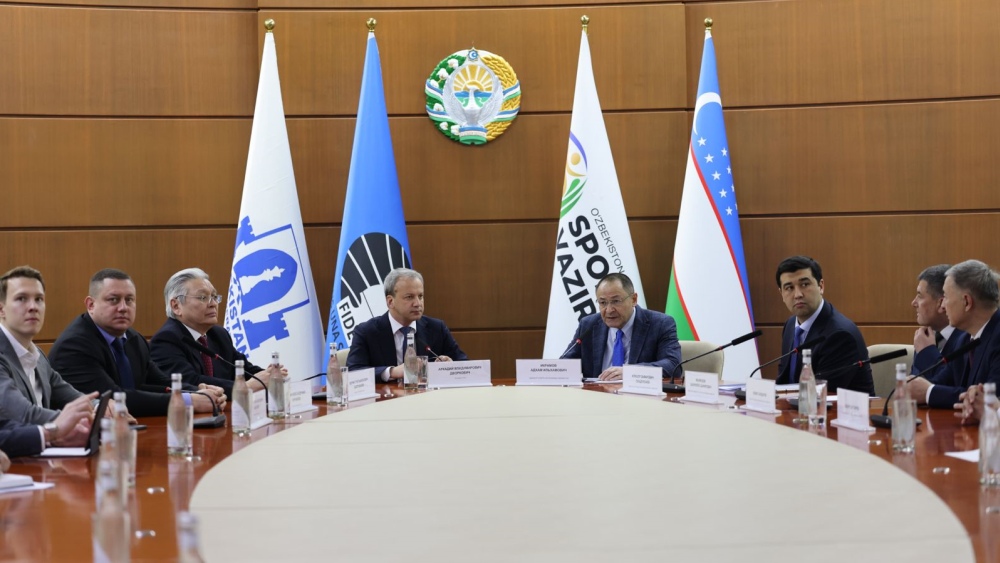
In early March, a FIDE delegation led by President Arkady Dvorkovich visited Uzbekistan as part of preparations for the 46th Chess Olympiad, which the country will host in 2026 in Silk Road International Exhibition Center, Samarkand. Upon arriving in Uzbekistan’s capital, Tashkent, on March 6, the FIDE delegation participated in a session of the organizational committee for the Olympiad, held at the Ministry of Sports of the Republic of Uzbekistan. In his opening speech, Minister of Sports Adkham Ikramov expressed gratitude for the trust FIDE had placed in Uzbekistan and assured that the 46th Chess Olympiad would be organized at the highest level. Alisher Sadullayev, 1st Vice-President of the Uzbekistan Chess Federation, echoed this sentiment, stating that the country is well-prepared to host such a prestigious competition. FIDE President Arkady Dvorkovich commended the organizers’ efforts and thanked Uzbekistan for its unwavering support of chess. “We are grateful to the Minister of Sports and all our colleagues for their contributions and input to the organizational process. We discussed all aspects of the preparations for the 46th Chess Olympiad and the FIDE Congress. Everyone is involved, everyone knows their responsibilities, and we are confident that, as a united team—FIDE and Uzbekistan’s authorities—we will achieve the best possible result. This is especially true with the support of top-level officials, including the President of Uzbekistan, the government, the President of the Uzbekistan Chess Federation, and the Minister of Sports,” said Arkady Dvorkovich. The session continued with local authorities reporting on progress in logistics, accommodation, software development based on FIDE’s recommendations, and the implementation of a simplified visa process for participants and guests. Uzbekistan has rapidly risen in the chess world, with five players currently ranked among the world’s top 100, underscoring the country’s growing prominence in the sport. The nation won the 2022 Chess Olympiad and recently secured bronze at the 2024 Chess Olympiad in Budapest. In recent years, Uzbekistan has hosted several major chess events, including Pool B of the 2022 Women’s Candidates Tournament in Khiva and the 2023 World Rapid and Blitz Championship. In 2025, Uzbekistan will host the FIDE Grand Swiss, the largest Swiss-system tournament of the year, serving as a test event for the 2026 Olympiad.
EDU Commission announces its 23rd Preparation of Teachers course

Want to learn how to teach chess to children effectively? Join the 23rd “Preparation of Teachers” certified online course, organized by the Chess in Education Commission of the International Chess Federation (FIDE)! When? March 21–23, 2025 Where? Online, conducted in English Fee: 100 EUR Limited spots: Only 20 available! 15 hours of practical training Modern teaching methodologies Integration of chess with critical thinking, literacy, and mathematics FIDE School Instructor title upon successful completion of the course Bonus: Successful candidates get lifelong access to OPENING MASTER PREMIUM chess databases. Who is this course for? Teachers and chess educators Beginner and advanced chess players Anyone who wants to make chess part of the educational process Important: Attendance at all sessions is mandatory. At the end of the course, you will take an exam and have the opportunity to receive the FIDE School Instructor title with a three-year license. Read the detailed course description here. Register now: https://cloud.fide.com/s/SrbcPoqA8cDtbcd Registration deadline: March 17, 2025 Note: Titles are conferred during the subsequent FIDE Council meeting and will reflect on FIDE profiles approximately four weeks thereafter. Share with colleagues and friends! Let’s make chess education more accessible and effective together! If you have any questions, please feel free to contact us at edu.courses@fide.
FIDE Commission for Women’s Chess partners with Prague Chess Festival: A milestone for girls in chess
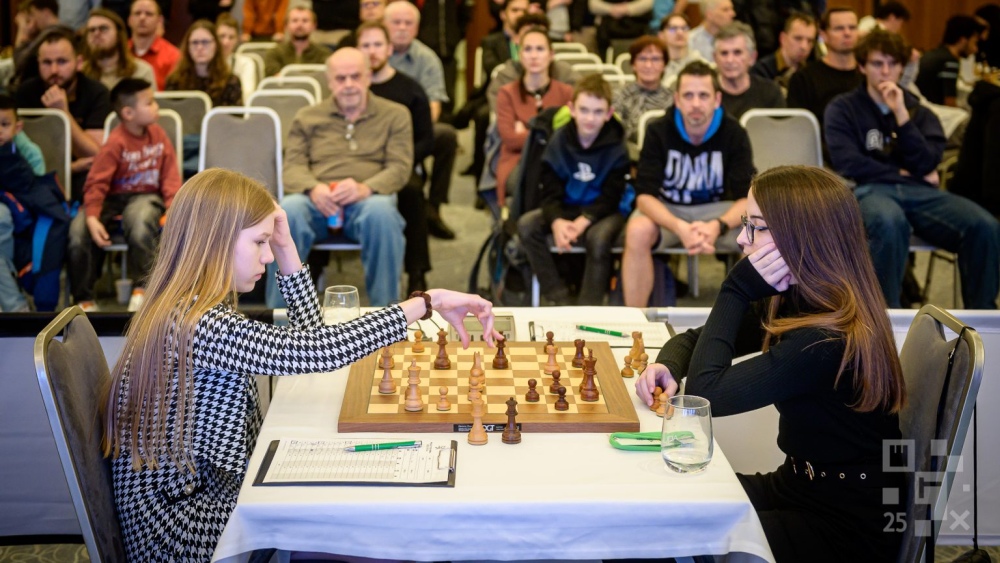
A prestigious opportunity for young talents The Prague Chess Festival continues to set new standards for chess excellence, and this year, its commitment to fostering young talent took a remarkable step forward. In collaboration with the FIDE Commission for Women’s Chess, the festival invited ten talented girls to compete in the prestigious Futures Tournament—an event running alongside the renowned Super Tournaments, where top grandmasters like Praggnanandhaa Rameshbabu, Anish Giri, Vincent Keymer, and David Navara showcase their skills. For these young players, it was more than just a tournament; it was a dream come true. Imagine the thrill of walking into the same playing hall as the world’s best, playing on the same stage, and knowing that the eyes of chess enthusiasts from around the globe were upon them. Each move on the board carries weight, but so does the experience of being treated like stars—something that is still rare for many young female players. It is in moments like this that young talents can come to a life-changing realization: they belong here. Learning beyond the board Beyond the competition, the Prague Chess Festival ensured that the girls received an enriching and educational experience. On their free day, not for another match, but for an opportunity just as valuable—learning from one of the most influential women in chess. A special program was organized, featuring an exclusive lecture and a simultaneous exhibition by WGM Dana Reizniece, Deputy Chair of the FIDE Management Board and an esteemed ambassador of the Futures Tournament. Dana’s presence added immense value, as she shared her insights, experiences, and guidance with the young participants, reinforcing the message that women in chess have a powerful role to play at all levels of the sport. Inspiring lecture by WGM Dana Reizniece Seated in a quiet hall, the girls listened intently as Dana Reizniece took them on a journey beyond the 64 squares. She spoke not just as a grandmaster, but as a leader, a mentor, and a role model. Her words carried the weight of experience and wisdom, offering lessons that extended far beyond chess. Be unique but authentic—how to achieve it & why it is important “Reach the goals others only think of” Stay open-minded and remember that many skills you learn in chess can help you in life, even if you don’t become a top player The importance of rituals and habits in your life It was truly an enriching experience for girls. Parents, too, listened closely, knowing that these words would resonate throughout their daughters’ journeys for years to come. Plenty of seeds were certainly planted today, and we think they shall sprout into some inspiring stories, with the girls on the main stage – just as they are here in the Prague Festival. A fierce battle in the simultaneous exhibition Following the lecture, the girls were ready for a challenge of a different kind—a simultaneous exhibition against Dana herself. With ten boards arranged in a circle, Dana walked from one to the next, making her moves swiftly but thoughtfully. The girls, eager to prove themselves, fought with determination, each hoping to claim a victory against a grandmaster. The battle lasted an astonishing four hours. Move by move, girls tried their best. Some seized their chances, punishing even the slightest missteps. In the end, Dana secured a hard-fought 6:4 victory, a testament to both her strength and the remarkable talent of the young players. Reflecting on the experience, she shared: “What a tough simultaneous chess game exhibition it was! This year, the Prague International Chess Festival invited 10 talented girls to play in their Futures Tournament along with top grandmasters! It took me 4 hours, and I hardly won with 6:4. I enjoyed seeing such good chess by the girls, stabbing me in the most vulnerable spots of the position and penalizing me for even a minor mistake.” A step forward for women in chess The Futures Tournament at the Prague Chess Festival stands as a shining example of how chess can bridge the gap between aspiring young players and the professional elite. More than that, it is a statement—a declaration that young girls in chess deserve the same grand stage, the same recognition, and the same belief in their potential. For these ten girls, Prague is not just another tournament. It is a glimpse into a future where they belong at the top. It is a moment of validation, a spark that could ignite a lifetime of ambition. The FIDE Commission for Women’s Chess is really proud to collaborate with the organizers of this extraordinary event and remains committed to supporting such initiatives and expanding opportunities for girls worldwide, empowering them to dream big and achieve greatness in the world of chess. Photos: Prague Chess Festival
FIDE WGP Cyprus 2025 Preview
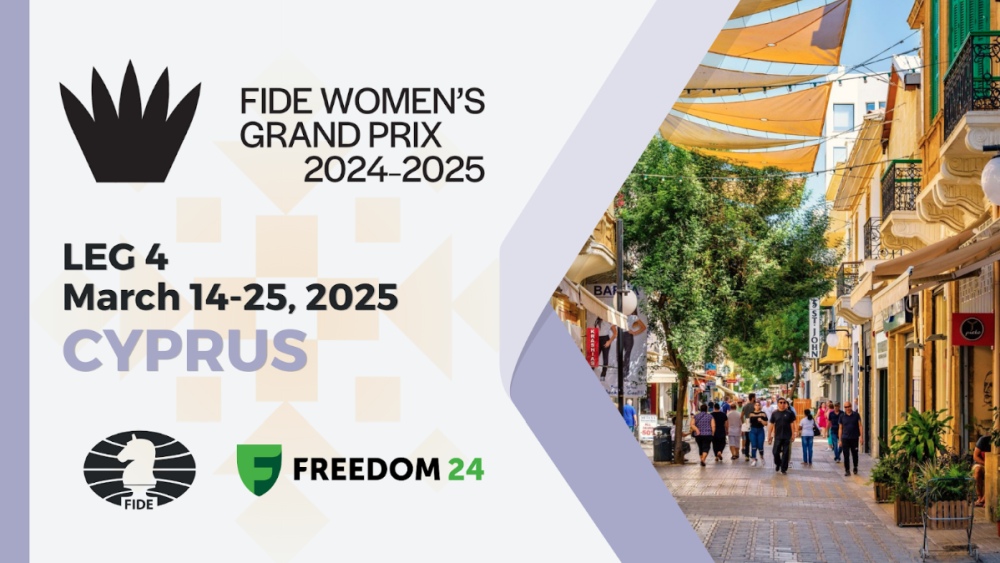
The fourth leg of the 2024-25 FIDE Women’s Grand Prix is set to take place in Nicosia, Cyprus, from March 14-25, under the auspices of the International Chess Federation and Cyprus Chess Federation. This event brings the tournament series to the idyllic Mediterranean setting, where ten of the world’s leading female players will gather in the capital city to battle not only for prizes but also for the critical Grand Prix points that will determine qualification for the next FIDE Women’s Candidates Tournament. About the Event The Women’s Grand Prix Series 2024–25 features 20 players, with each player participating in three of the six tournaments. Each event is a 10-player round-robin, where participants earn points based on their final standings. The series winner is determined by the total cumulative points earned across all three tournaments played. Prize Fund: €80,000 per event, with an additional €120,000 distributed among the top 10 finishers in the overall standings. Qualification: The top two players from the series will qualify for the 2026 FIDE Women’s Candidates Tournament. Participants The event boasts a stellar lineup, including Aleksandra Goryachkina, who leads the Grand Prix standings after consecutively winning the second and third legs in Shymkent and Monaco. Also returning are Indian stars Harika Dronavalli and Divya Deshmukh, and the celebrated Muzychuk sisters, Anna and Mariya. Also competing are former European Champion Nana Dzagnidze, German No. 1 Elisabeth Paehtz, Greece’s top player Stavroula Tsolakidou, and this season’s newcomers, Zhu Jiner, and Olga Badelka, who replace Lei Tingjie and Regina Theissl-Pokorna in the series. After three out of four legs completed, Aleksandra Goryachkina leads the Grand Prix standings, having secured first place in both the Shymkent and Monaco legs. This is her final opportunity to accumulate points. FIDE President Arkady Dvorkovich emphasized the importance of the Grand Prix series as a dedication to advancing women’s chess, stating, “This tournament not only showcases the exceptional talents of the women’s elite in chess but also reinforces our commitment to promoting chess globally” further adding that, “Creating a strong women chess community is very important for us to continue pursuing our goals and representing the interests of women in chess. We look forward to witnessing high-level chess in Cyprus.” Venue Nicosia, the capital of Cyprus, will provide a picturesque backdrop for this prestigious event. Participants can look forward to experiencing the city’s unique culture, historic sites, and Mediterranean charm. Nicosia is also the largest city of Cyprus and has established itself as the island’s financial capital and its main international business center. Schedule and Round 1 Pairings The first round is scheduled for March 15th at 15:00 Eastern European Time, with the pairings already out. To ensure fair play, players from the same countries are paired in the first round, setting the stage for intense matchups from the outset: Aleksandra Goryachkina vs. Nana Dzagnidze Anna Muzychuk vs. Mariya Muzychuk Divya Deshmukh vs. Harika Dronavalli Stavroula Tsolakidou vs. Elisabeth Paehtz Zhu Jiner vs. Olga Badelka Full pairings (PDF) Timur Turlov, CEO of Freedom Holding Corp., expressed his support for the event, stating, “We value chess not only for its intellectual depth and versatility, but also for the opportunity for everyone to show their strength at the board, regardless of gender and age. Today, women are increasingly confident and brightly declaring themselves in the chess world, demonstrating exceptional willpower, strategic thinking, and strength of character. They break stereotypes and prove that chess is a unique space for self-expression. Freedom Holding Corp., as one of the largest sponsors of the chess movement, is proud to support this inspiring trend. We believe in the power of women’s skill and will follow the fourth stage of the World Grand Prix with interest.” Evgenii Tiapkin, Executive Director at Freedom24, reaffirmed the company’s commitment to promoting chess in Cyprus, stating, “On the eve of the fourth stage of the FIDE Women’s Grand Prix in Nicosia, supported by Freedom24, we reaffirm our commitment to promoting chess in Cyprus through our partnership with the Cyprus Chess Federation. Chess cultivates strategic thinking and resilience, qualities that are invaluable both in sports and in life. As part of our long-term dedication, I am pleased to announce the upcoming opening of the Freedom Chess Academy in Limassol, aimed at nurturing future champions and promoting the game within local communities.” For more information and live updates, visit the official website. You can follow the games with expert commentary by GM Alik Gershon and WGM Anastasia Karlovich, and read daily reports written by press officer Michael Rahal. Join us in Cyprus to witness world-class chess as these elite players compete for glory and a spot in the 2026 FIDE Women’s Candidates Tournament.
World Junior Championship 2025 crosses midpoint
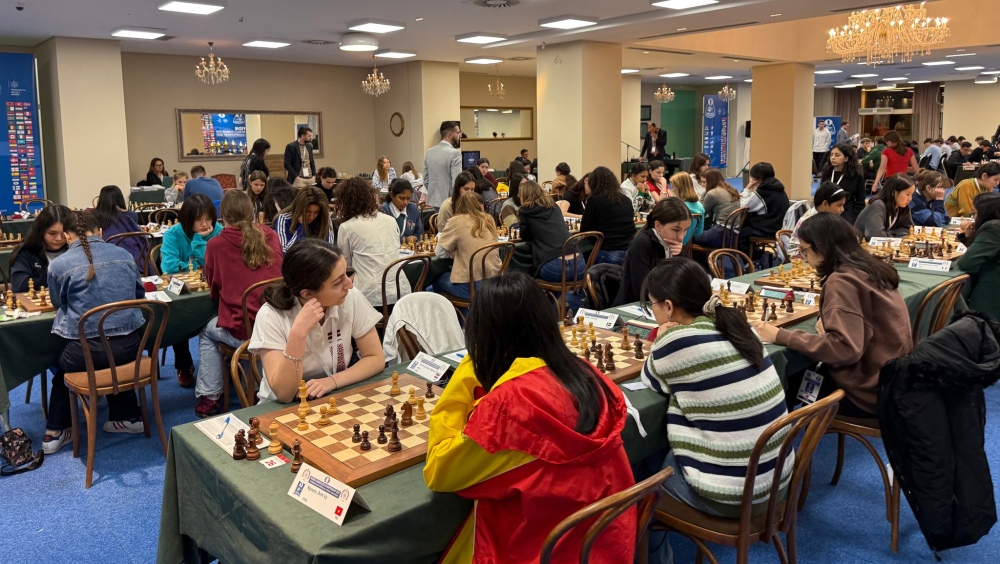
Six exciting rounds have been played at the FIDE World Junior Chess Championship in Petrovac, Montenegro. Due to the decision to start the championship one day later, participants have played every day without a rest day. After six rounds, GM Venkatesh Pranav (IND, 2602; pictured below) leads the open section with 5.5 points. The Indian GM is closely followed by GM Yahli Sokolovsky (ISR, 2552), IM Adar Tarhan (TUR, 2460), and Meng Yihan (CHN, 2412), who all have 5 points. The tournament’s top seed, GM Daniel Dardha (BEL, 2652), is in a large group of players with 4.5 points. Standings after Round 6 Open In the women’s section, four players are tied at the top after six rounds: WIM Ayan Allahverdiyeva (AZE, 2284; pictured below), WIM Umida Omonova (UZB, 2228), WFM Keseria Mgeladze (GEO, 2219), and WFM Mariya Yakimova (FIDE, 2201;)—all with 5 points. They are followed by a group of six players with 4.5 points. Standings after Round 6 Girls Notably, the Fujairah Chess Club has announced that the winners in both categories will receive free accommodation and covered travel expenses for the 1st Fujairah Global Chess Championship, set to take place from August 25 to September 2, 2025. This was announced by the club’s Vice President, Mr. Mohammed Abdullah Al Zaabi, who also made the ceremonial first move in the sixth round. Jovan Milovic, President of Montenegro Chess Federationd and Mr. Mohammed Abdullah Al Zaabi Vice President of Fujairah Chess and Culture Club Here are two interesting games of played in Rounds 3 and 4, with brief commentaries. Chasin,Nico (2415) – Pranav,V (2615) [D20] World Junior Chess Championship (3.1), 27.02.2025 1.d4 d5 2.c4 dxc4 3.e3 e5 4.Bxc4 Nc6 5.Nf3 e4 6.Nfd2 Qg5 Black has chosen a very agressive, but risky line. 7.Nxe4 Qxg2 8.Ng3 Qh3 9.Nc3 Nf6 10.e4 10.Qb3!? should be considered as well. 10…Bg4 11.f3? The risky strategy pays off. One wrong move is all it takes for Black to take over the initiative. 11.Qa4 was the correct response, with better prospects for White. 11…0–0–0! 12.Be3? 12.fxg4 Nxd4 13.Bf1 Qh4 14.Be3 Bc5 seems quite dangerous for White, but it was probably the best hope for survival. 12…Bc5! From this moment on, the pressure on White position just keeps growing. 13.Bd5 Nxd5 14.Nxd5 Bd6 15.Kf2 Be6 16.Nc3 16…f5! The end is near. 17.Bg5 Rd7 18.d5 f4 19.Nge2 Bc5+ 20.Ke1 Qg2 21.Rf1 Bh3 Facing huge material losses, White resigned. 0–1 (2032) Kaldarova,Ayaulum (2248) – Nurman,Alua (2336) [A34] World Junior Chess Championship (4.3), 28.02.2025 1.Nf3 c5 2.c4 Nf6 3.Nc3 Nc6 4.g3 d5 5.d4 cxd4 6.Nxd4 e5 7.Nxc6 bxc6 8.Bg2 d4 We see another ultra-agressive, but risky set-up for Black. 9.Bxc6+ Bd7 10.Bxa8 Qxa8 11.Nd5 Nxd5 12.cxd5 Qxd5 Objectively, Black might not have full compensation, but it’s quite easy to go wrong as White in such a position. 13.f3 Bc5 14.Qd3 0–0 15.a3? And one mistake is again all it takes. 15.Bd2 was a much better option. 15…f5! White is already in big trouble. 16.e4? This only helps Black, but the correct 16.b3 e4 17.fxe4 fxe4 18.Qc4 Qxc4 19.bxc4 e3 was also difficult for White. 16…fxe4 17.fxe4 Qb7 18.Bd2 Kh8 19.a4 Bh3 20.Rg1 Qxb2? Complicating things. The simple 20…Qf7 would finish the game quickly. 21.Rb1? But White returns the favour. She could’ve forced the Queen exchange with 21.Qb1, keeping good chances to hold. 21…Qa2 22.g4 Qf7 The Queen has finally found the right square, and it’s all over now. 23.Kd1 Qf2 24.Qxh3 Qxg1+ 25.Be1 Bb6 26.Qh4 Qe3 27.Qg3 Qxe4 28.Rb3 Rc8 0–1 Photos: Mitar Djukanovic Official website: https://worldjunior2025.sahcg.me/

